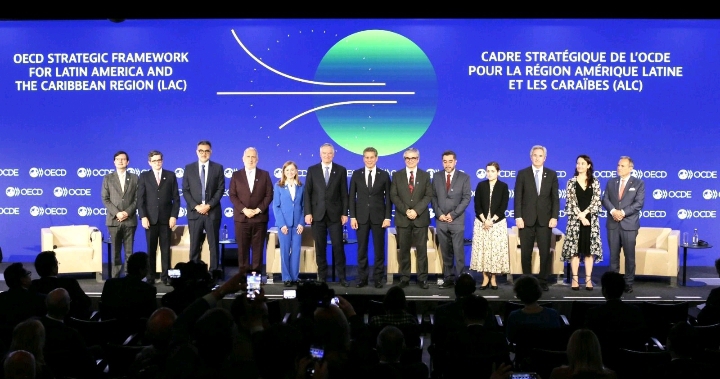OECD 2025 Ministerial Council Meeting Ends, Call for Resilient, Inclusive, and Sustainable Global Prosperity.
By Raymond Enoch
Ministers and senior officials from across the globe gathered in Paris this week for the 2025 OECD Ministerial Council Meeting (MCM), where they issued a strong and united call for resilient, inclusive, and sustainable economic growth.
Chaired by Costa Rica, with Australia, Canada, and Lithuania serving as Vice-Chairs, the high-level meeting convened representatives from 38 member countries and key partners. Under the theme, “Leading the Way towards Resilient, Inclusive, and Sustainable Prosperity through Rules-Based Trade, Investment, and Innovation,” the MCM focused on pressing global economic challenges, ranging from digital transformation to sustainability and geopolitical stability

Central to the discussions was the reaffirmation of the OECD’s commitment to open markets and a rules-based international trading system. Ministers emphasized the need for stronger, more transparent investment and trade frameworks that enhance global economic to in shaping inclusive economic futures. Officials underscored the importance of leveraging digital tools not just for innovation, but to ensure that marginalized populations can benefit from the digital economy. The meeting stressed inclusive digital policy strategies that support equal access and economic empowerment for all.
Sustainability was another core pillar of the meeting. Ministers shared national and collective strategies aimed at integrating environmental priorities into economic policy. Climate-conscious innovation, green infrastructure investment, and social equity emerged as key targets for shaping future-ready economies.
The meeting also marked the launch of the OECD Paraguay Country Programme, designed to deepen cooperation with Latin America and the Caribbean. Furthermore, the Philippines and Canada were named incoming co-chairs of the OECD Southeast Asia Regional Programme, following Vietnam and Australia. These steps underscore the OECD’s intent to broaden regional engagement and reinforce multilateral collaboration.
In response to continued conflict in Eastern Europe, the OECD expressed unwavering support for Ukraine’s recovery and reconstruction. Ukrainian Prime Minister Denys Shmyhal and Deputy Economy Minister Taras Kachka attended the sessions, where global leaders reiterated their commitment to supporting Ukraine amid ongoing aggression.
Gender policy also took center stage, with the OECD launching the pilot of its Dashboard on Gender Gaps and unveiling a roadmap for its Gender Data Initiative. Both tools are designed to support data-driven approaches to closing persistent gender disparities and promoting inclusive social policies.
Ministers approved updates to a number of critical OECD legal instruments. These included new recommendations on Artificial Intelligence ethics, improved governance guidelines for state-owned enterprises, and strengthened standards for lobbying transparency and integrity—demonstrating the organization’s responsiveness to emerging global issues.
As the two-day summit concluded, the OECD reaffirmed its mission to be a cornerstone of global dialogue and cooperation. The Ministerial Council emphasized the importance of multilateralism and data-driven policymaking in navigating a rapidly changing global landscape.
The 2025 MCM not only charted policy directions for the year ahead but also reinforced the OECD’s role as a global convener dedicated to advancing resilience, inclusion, and sustainable prosperity for all.









